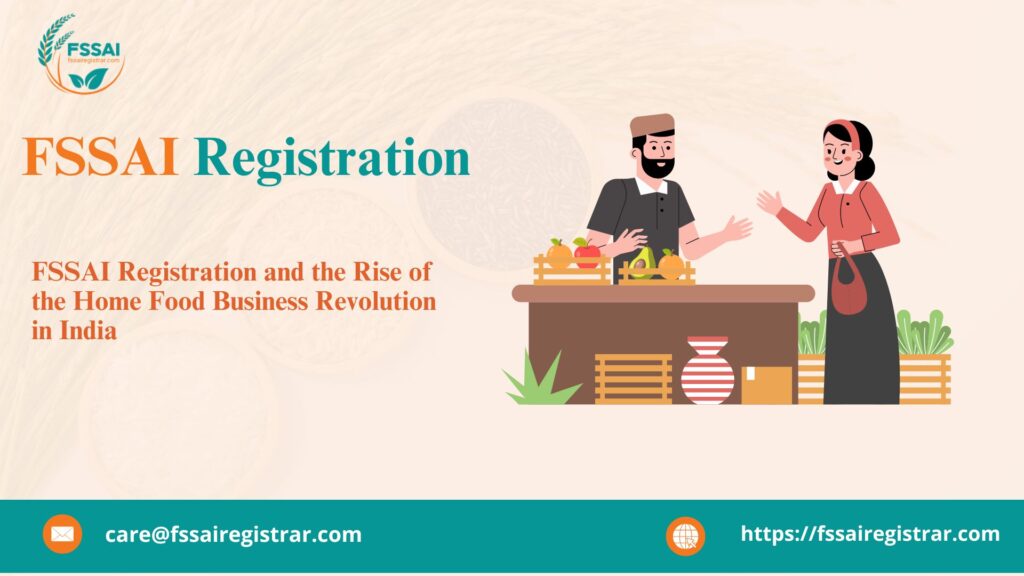
In the last few years, India has witnessed a remarkable transformation in its food sector, especially at the grassroots level. Fueled by digital platforms, changing consumer preferences, and the pandemic-driven shift toward homemade and hygienic meals, home-based food businesses have emerged as a growing economic force. At the heart of this revolution is one key regulatory element — FSSAI Registration.
While FSSAI (Food Safety and Standards Authority of India) was traditionally associated with large-scale food manufacturers and restaurants, it is now playing a pivotal role in empowering home chefs, small food entrepreneurs, and cottage industries to enter the formal food market. This article explores the unique intersection between FSSAI registration and the growth of home-based food businesses in India, how it adds credibility and compliance, and why it is essential for sustainable success.
What is FSSAI Registration?
FSSAI stands for the Food Safety and Standards Authority of India, a government body under the Ministry of Health and Family Welfare. Its primary objective is to regulate and monitor food safety across the country by ensuring food businesses comply with proper standards.
FSSAI registration is mandatory for all food-related businesses in India, including:
- Manufacturers
- Re-packers and re-labellers
- Distributors and wholesalers
- Food delivery services
- Retailers
- Home-based food sellers
There are three types of FSSAI licenses depending on the scale of business:
Basic FSSAI Registration – For businesses with an annual turnover of up to ₹12 lakh
State FSSAI License – For turnover between ₹12 lakh and ₹20 crore
Central FSSAI License – For large-scale operations or businesses operating across states
For most home-based food businesses, the basic FSSAI registration is sufficient and easy to obtain online.
Why Home Food Businesses Are on the Rise
There are several reasons behind the boom in home food ventures:
Pandemic-Driven Opportunities
COVID-19 changed how people perceive hygiene and nutrition. Many began avoiding restaurants and turned to home chefs offering fresh, preservative-free meals.
Digital Platforms and Social Media
With the rise of platforms like Instagram, WhatsApp, Swiggy, and Zomato, home food businesses now have access to direct marketing and delivery channels, reducing dependency on physical storefronts.
Support for Women Entrepreneurs
Cooking from home has empowered thousands of women and homemakers to turn their passion into a business without needing massive investments.
Cultural Relevance
Customers today are seeking authentic, regional, and traditional recipes that large chains can’t replicate. Home chefs are perfectly positioned to deliver on this front.
Why FSSAI Registration is a Game-Changer for Home Foodpreneurs
While starting from home may seem informal, FSSAI registration transforms the business into a credible, legal, and growth-ready entity. Here’s how:
Builds Trust with Customers
Displaying an FSSAI registration number on packaging, websites, or delivery boxes assures customers that the food complies with hygiene and safety standards.
Access to Online Delivery Platforms
Major delivery aggregators like Swiggy, Zomato, and Amazon Pantry require FSSAI compliance before onboarding any food vendor.
Participation in Exhibitions and Food Festivals
If you want to showcase your products at food expos or pop-up events, having an FSSAI registration is often a mandatory requirement.
Protection from Legal Penalties
Operating without an FSSAI license, even from home, can lead to hefty fines (up to ₹5 lakh) or even business closure by authorities.
Improves Supply Chain Access
Once registered, businesses can tie up with wholesalers, packaging vendors, and cold chain services to scale their operations.
FSSAI Registration Process for Home-Based Food Businesses
Getting FSSAI registered is a straightforward process, especially for micro-entrepreneurs. Here’s a step-by-step guide:
Visit the Website:- Go to the official FSSAI registration portal online.
Fill the Form:- Enter your name, mobile number or email, business name, food type, business type, and full address.
Upload PAN Card:- Attach a clear copy of your PAN card.
Review and Submit:- Check all the details carefully, then click on “Submit.”
Pay the Fees:- Pay the registration fee online using UPI, card, or net banking. The fee depends on the type of license you need.
Verification Call:- After payment, our executive will call you to confirm your details through an OTP sent to your mobile or email.
Inspection (If Needed):- In some cases, FSSAI officials may visit your place for a quick inspection.
Download Your License:- Once approved, you can download your FSSAI license directly from the website.
Challenges Faced by Home-Based Food Businesses
While the potential is huge, there are also challenges that FSSAI registration helps address:
- Lack of standardisation in labelling, expiry dates, and ingredients
- Difficulty sourcing clean packaging material
- Issues with shelf-life and food preservation
- Scaling beyond family and friend circles
- Compliance fear due to low awareness
Government initiatives like Eat Right India, food safety training (FoSTaC), and FSSAI helplines are helping bridge these gaps.
Future Trends: FSSAI’s Role in India’s Food Tech Evolution
As India’s food habits evolve, so will the role of FSSAI:
- QR Code Labels for traceability in homemade foods
- Training programs for home cooks in hygiene and packaging
- Mandatory nutrition labeling for packaged snacks
- Collaboration with food influencers to spread awareness
- Integration with Udyam and GST for end-to-end compliance
By fostering trust and quality, FSSAI will be the backbone of India’s decentralized food economy, from city kitchens to village meals.
Suggested read:- Renewing and upgrading your FSSAI License
Conclusion
FSSAI registration is more than just a legal formality. For home-based food entrepreneurs, it is:
A mark of hygiene and trust
A key to growth and visibility
A protection against legal risks
A path to scaling your passion into a profession
If you’re someone dreaming of selling pickles, cakes, tiffin meals, or sweets from your home, start with FSSAI. It’s simple, affordable, and the foundation of your brand’s credibility.






